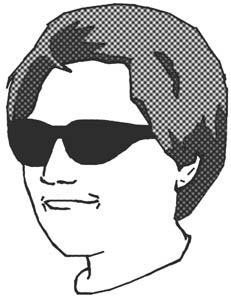![[Metroactive Features]](/features/gifs/feat468.gif)
[ Features Index | Silicon Valley | Metroactive Home | Archives ]

Techsploits On Record By Annalee Newitz WE ARE THE laboratory for the future surveillance state," said Bill Brown, pointing at the Seventh Avenue entrance to the Long Island train station in New York. Under a vaguely menacing tower of glass and girders, four surveillance cameras were tucked up next to the ceiling. Beneath them, two members of the National Guard lounged with their guns. "Why do we need humans and cameras to watch us?" Bill wondered angrily. The 25 people following him and listening intently peered into the train entrance, trying to look back into the eyes looking at them. We were on the "Surveillance Camera Tour" of New York City, hosted by Bill, a member of the Surveillance Camera Players, an activist group devoted to the paradoxical idea of privacy in public. "What's great about New York City is that no matter how weird you are or how famous you are, you can blend in with the crowds," Bill argues. "Surveillance cameras take that away from us. They're almost like guards asking you to show your papers on the street." U.S. privacy laws allow public surveillance because, it is said, you have no reasonable expectation of privacy on the street. But Bill and his fellow activists think New York's mechanical eyes violate human dignity, converting our anonymous public lives into somebody's private video collection. To raise people's awareness about the thousands of surveillance cameras in the city, members of the Surveillance Camera Players lead tours where sightseeing means finding cameras hidden in street lamps and mounted high on the walls of buildings. Sometimes the Players stand under cameras and hold up signs with slogans like "None of Your Business." The tour began at the entrance to our hotel, where we were attending the annual Computers, Freedom and Privacy Conference (www.cfp2003.org). After having gone to countless panels on how our digital privacy was being violated right and left by the Bush/Ashcroft regime, we were ready to see for ourselves what eroding privacy rights had done to the landscape of the Big Apple. Bill handed out maps of New York's fashion district--roughly the area between 11th Avenue and 32nd Street, and Sixth and 38th--with little bubbles all over it. Each bubble was a surveillance device, labeled with a letter that signified who owned the equipment in that spot. Most of the map was lousy with bubbles, the majority of them marked "p" for private. A surprising number were also marked "g" for government and "c" for city or NYPD. As we gazed up at the two cameras attached several feet over our heads over the New Yorker Hotel's grand entrance, Bill explained that once you know where to look, you'll discover that your movements are being recorded everywhere. "Most people treat the city like a tunnel, and they never look above the level of other people's mouths--they don't want eye contact," he said. "But when you look for cameras, you have to look up." Across the street, several stories up on the roof of Reise restaurant, we spotted a webcam tracking our movements. We reached a crescendo of privacy invasion at the Macy's loading docks, where three generations of cameras encrusted seemingly every surface. Stationary cameras from the '70s were positioned next to contemporary remote-controlled roving cameras and '80s-era lenses that were disguised by egg-shaped plastic covers resembling lamps. As we walked past delivery trucks, a guard with a headset and a large dog watched us wave at whoever was monitoring the cameras. Maurice Wessling, a privacy advocate from Holland, admired the camera setup and laughed sardonically. He said his organization, Bits of Freedom (www.bof.nl) created a similar map of Amsterdam (www.spotthecam.nl). Over the next several months, Wessling said, the Amsterdam police are planning to blanket the city's famed red-light district in manned surveillance cameras for crime prevention. But the problem with most cameras in Amsterdam, Wessling explained, is that you don't know who owns them. Unlike the United States, countries like Holland that adhere to the European Privacy Directive policies abide by a rule stating that citizens must be able to gain access to data collected about them (except data that's part of a criminal investigation). "But you can't ask for the information these cameras record, because you don't know who is gathering it," said Wessling. People in the United States, of course, have nothing like the Privacy Directive that allows them to articulate what's wrong with having their movements taped on the street. More disturbing than having our movements committed to media records in perpetuity is the fact that we don't know who is doing it and why. I suppose what I'm saying is that gathering information isn't the problem. It's what you make of it.
Annalee Newitz (spycam@techsploitation.com) is a surly media nerd who sure has been thinking a lot about Amsterdam lately.
Send a letter to the editor about this story to letters@metronews.com. [ Silicon Valley | Metroactive Home | Archives ]
|
From the April 10-16, 2003 issue of Metro, Silicon Valley's Weekly Newspaper.
Copyright © Metro Publishing Inc. Metroactive is affiliated with the Boulevards Network.
For more information about the San Jose/Silicon Valley area, visit sanjose.com.